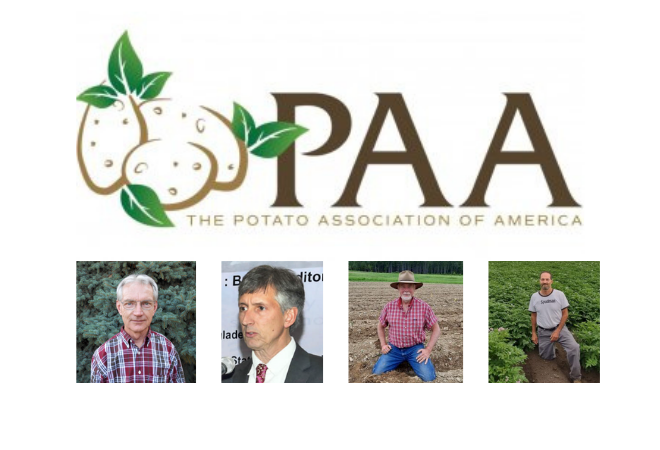
Potato Association of America names four Honorary Lifetime Members
One of the most significant ways to recognize outstanding contributions to the potato industry and to our organization — the Potato Association of America (PAA) — is the awarding of Honorary Life Memberships (HLM).
This is the highest award bestowed upon an individual by the PAA. Each year at the annual meeting, this award is given to deserving individuals and is considered by many to be the highlight of the banquet.
In 2021, the PAA honored William H. Bohl, David Douches, Steven Johnson and Robert Thornton. Each of these scientists have brought contributions to the potato industry in different ways. Here are their biographies and some “words of wisdom” they have to share.
William H. Bohl
Bohl’s earliest recollection of working with potatoes was helping plant them in a large garden on the family farm near Pompey’s Pillar, a tiny, now almost non-existent, town in south central Montana. Having been raised on a farm where they grew sugar beets, dry beans, alfalfa and barley along with raising a small herd of beef cattle, William (Bill) always had a passion for agriculture.
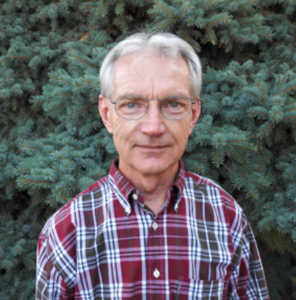
Bohl earned a bachelor’s degree in crop production from Montana State University in 1973 and immediately continued on to earn a master’s in agronomy from South Dakota State University. He then participated in a six-month IFYE exchange program, where he lived with six farm families in Sweden for three weeks apiece. After arriving back in the U.S., he taught agriculture courses at Chadron State College in Nebraska for one semester, followed by teaching at the University of Minnesota Crookston, then known as University of Minnesota Technical College.
Bohl’s experience in Minnesota fostered a desire to pursue a Ph.D. He attended Iowa State University on a graduate teaching assistantship. His doctorate research program was studying nitrogen fixation in alfalfa that led to a Ph.D. in crop production and physiology in 1981.
Bohl took a meandering route before becoming involved with the potato industry. His experience in agriculture post-Ph.D. included an off-campus Extension Specialist/Agronomy position with the University of Wyoming with emphasis in forage management and as a technical services manager for a Midwestern seed company.
He was hired in 1990 by University of Idaho as a multi-county Extension educator working with potato producers in a three-county area that included approximately 100,000 acres of potatoes. His assigned location was in Blackfoot, but he spent many hours at the Aberdeen Research and Extension Center, where he learned from many excellent people working in potatoes, including Steve Love, Larry Sandvol, Joe Pavek and Dennis Corsini. Love was instrumental in helping Bill learn about potatoes, and they cooperated on a number of research projects mostly concerning seed piece spacing and depth of which some were published in the American Journal of Potato Research (AJPR). Bill held the multi-county Extension Educator position until July 2010, when his responsibilities with UI were reassigned to mainly horticulture.
Bill’s work in potatoes extends beyond the geographical area he was assigned. From 1991 to 2010, he published the Spudvine newsletter that contained one potato-related article. Of the 210 articles published, Bill authored or co-authored 140 (67%) and edited all others. In 2012, the PAA recognized Bill with the Outstanding Extension Project Award for this newsletter. In 2010, Bill and Steve Johnson of the University of Maine were editors of the second revision of Commercial Potato Production in North America. The previous revision had been completed in 1992 by Joseph B. Sieczka, Cornell University and Robert Thornton of Washington State University. Bill authored or co-authored chapters in the first and second editions of the book, Potato Production Management Systems.
Bohl’s service to the PAA includes holding all offices of the Extension Section. He was instrumental in developing and obtaining approval for the Outstanding Extension Project Award that was first awarded at the PAA meeting in 2010. Bill served as director on the executive committee for one year, was a member of the site selection committee for 14 years and chair of that committee for four years. Bill was a member of one local arrangements committee and co-chair for the PAA meeting in Idaho in 2007. He served four years as Senior Editor-Production and Management of the AJPR.
After 24 years with UI, Bohl retired in May 2014. No longer working with potatoes, he now enjoys riding a road bicycle in the summer and teaching skiing in the winter.
In recognition of his exceptional service to the PAA and his many accomplishments, the Potato Association of America is pleased to designate William Bohl as an Honorary Life Member of the association.
Words of wisdom from Bohl: “You will never know how many people you may have influenced during your life. Among all your achievements, in the end, maybe these will truly be your greatest.”
David S. Douches
Douches, with more than 38 years of experience in potato breeding and genetics, has had an active potato breeding program directed toward the development of improved cultivars in Michigan for 34 years. The focus of the program is to develop new cultivars for the state’s potato industry, highly focused on chipping, by integrating new genetic engineering techniques with conventional breeding efforts. Key traits targeted for improvement are Colorado potato beetle resistance, disease resistance to scab, late blight, PVY and chip processing from long-term storage.
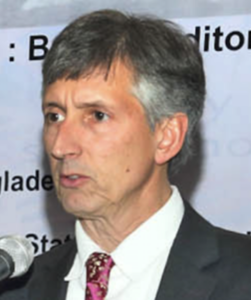
Douches leads the Michigan State University potato breeding and genetics project and co-PI in the North Central Regional Potato Breeding and Genetics project. He is director of the USAID-funded Feed the Future Biotechnology Potato Project for Indonesia and Bangladesh and the lead scientist in developing four potato SNP arrays used by the potato breeding and genetics community.
In recognition of his exceptional service to the PAA and his many accomplishments, the PAA is pleased to designate David Douches as an Honorary Life Member.
Word of wisdom from Douches: “Breeding, researching and growing potatoes defines part of our identity much more than other crops. I have a quiet sense of pride being part of a crop that feeds so much of the world. I hope the breeding and research I am doing will help the next generation create better potatoes.”
Steven B. Johnson
Johnson was hired as an Extension specialist at the University of Maine in 1988 and quickly rose through the academic ranks to the level of Extension Professor in 2000. He is synonymous with Maine potatoes and is well known in many potato-growing areas of the world as a scientist and an educator. His invitations to speak in many of the potato-growing areas of the U.S. and the world to share his expertise attest to this. In addition, three sabbatical leaves have resulted in world-wide contacts and a worldwide view of potato production and issues.
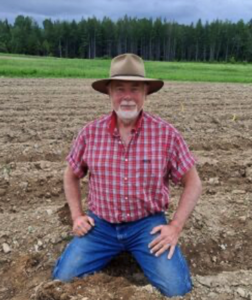
Steve has broad expertise in many aspects of potato production. Early in his career, high numbers of hospital visits and injuries during the potato harvest led him to develop a potato harvest safety program. Injuries were drastically reduced, and serious injuries were nearly eliminated. This effort resulted in a Citation for Meritorious Service to Safety from the Agricultural Division of the National Safety Council in 1992.
He wrote disease-forecasting software for late blight and early blight. The software was trialed on a southern hemisphere sabbatical leave to test the model before the next local growing season. The software targets region-specific weather patterns, but has been used outside of Maine as well. This effort resulted in Johnson receiving the Maine Potato Board President’s Award in 1995.
Communication of the specific information and recommendations was lagging behind the need for timely reporting. The establishment of a hotline brought the speed of communication up to that of the recommendations. The hotline still receives in excess of 1,000 calls per summer. This effort resulted in a Northeast Extension Director’s Award of Excellence in 1999.
Johnson has been on the forefront of two quarantinable pests that have threatened the U.S. potato industry. He has been a strong voice using science to help guide the response and actions on a regional and national level. This effort resulted in him receiving the Maine Potato Board President’s Award in 2002.
Johnson has always embraced a science-based approach and incorporated technology into his research and extension efforts. He has guided the Maine potato integrated pest management (IPM) program into recording weather stations. His efforts with potato IPM resulted in a Northeast Extension Director’s Award of Excellence in 2004.
The late blight epidemics have continued to evolve, as have Johnson’s approaches to disease control. Incorporation of translaminar and systemic materials, prediction of epidemic spread dynamics, and prescription-based approaches have been instrumental in reducing losses to late blight. The final part of the package was postharvest applications. In addition to carrier rate and chemistry, an applicator was developed. These efforts have virtually eliminated storage bin breakdown. He was recognized in 2008 with the Northeast Region Certified Crop Advisors President’s Award.
A PAA member before he arrived in Maine, he became involved with the PAA Extension Section Anti-Bruise committee where he served as secretary and chair of this committee, helping guide the efforts to address the identified issues. He went on to serve as secretary, vice chair, and chair of the Extension Section. He has likewise served in the Plant Protection Section. Additional PAA service includes contributing to and editing the Potato Production in North America publication, being on the Graduate Student Paper committee, and as a member on the organizing committees of PAA meetings held in Maine in 1995 and 2015.
Johnson excels in the field, where his problem-solving skills are in demand. He has always used science to guide solutions for growers in Maine as well as other places in the world. He has written fact sheets for applied use addressing the issues and solutions as well as journal publications and book chapters. These publications have improved the understanding of issues and have guided production improvements over many years. He has continually embraced technology for production improvements as well as for information delivery.
Best known for his work in potato pathology, he speaks broadly on disease-related topics. A strong proponent of IPM, he is on the American Society of Agronomy’s International Certified Crop Advisor exam committee, strengthening the IPM portion.
In recognition of his exceptional service to the PAA and his many research accomplishments, the PAA is pleased to designate Steven Johnson as an Honorary Life Member.
Words of wisdom from Johnson: “I came to Maine over 30 years ago. I had a passion for potatoes then, and it has never left. I’ve had terrific colleagues in and out of Maine to work with over the years. None of my success would have been possible without them. It doesn’t get any better than to be recognized by your peers and your professional society. Again, thanks to PAA and to all that helped me get here. I know I did not do it alone. I’m just a simple country boy.”
Robert K. Thornton
Thornton was born into a farming family in 1957 and was soon one of five siblings — three sons and two daughters. Thornton grew up in Pullman, Washington, but did plenty of farm work each summer, including at his family’s operation. He recalls listening to his dad give talks to potato farmers at Washington State’s annual Othello Fields Day.
In the early 1970s, Thornton experimented on a rapid method to detect bruising in potatoes, which he documented for the school paper. The method is still in use today.
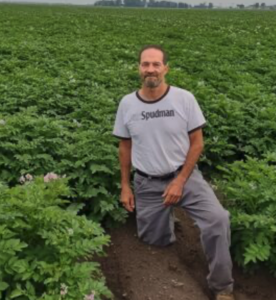
Thornton later earned both his bachelor’s and master’s degrees from nearby WSU. Nearing graduation, Thornton accepted a job as an agronomist for the UI Sugar Company in 1980. He spent the next 18 years conducting potato research and applying his findings to the more than 14,000 acres of processing potatoes. The company, now Agri Northwest Inc. (AGNW), allowed him to use some of his potato research toward getting his Ph.D. in crop science from Oregon State University in 1994. For that, he is eternally grateful. AGNW also allowed him to represent growers as a member of the Washington State Potato Commission (1989-91).
Beside conducting small plot research, he had access to over 15 years of on-farm data for over 14,000 acres of Agri Northwest’s potato fields. He analyzed that data for trends in potato yield and quality across all kinds of input parameters. He also got to use Dr. RE Thornton’s Potato Harvester and Harvest Equipment Anti-Bruise publications and information to refine and test the recommendations on 36 harvesters and storage equipment each year over the 18 harvest seasons.
While at Agri Northwest, he joined PAA. He remained an active member of the PAA’s Plant Physiology section until he left Agri Northwest in 1998. During those years, he served as a director in the Plant Physiology section, as well as an invited Journal Reviewer for the American Potato Journal for three years. In 1995, he gave one of the opening speeches to the PAA annual symposium hosted by the Plant Physiology section. In 1998, he became the Northwest Regional Agronomist for the RD Offutt Company covering Washington, Oregon and Nevada.
After two years, he realized that it would be more satisfying to work with people rather than for people. Fortunately, RDO agreed and Thornton Consulting Inc. was started. In the 20 years since, he has been fortunate enough to work with growers all over the U.S. and several other countries to give input as to how to grow a wide range of potato varieties in the fresh, chip, fry and seed industries. Thornton and family members travel throughout the country during potato harvest season to help growers and other potato organizations improve potato bruise by “timing harvesters and harvest equipment.”
He looks forward to once again becoming an active member of the PAA upon retirement, or as he likes to say, “when I choose to slow down.” Hopefully in the near future, he will run into some of his friends and colleagues from the potato industry he loves so much, probably in an airport.
In recognition of his exceptional service to the PAA and his many research accomplishments, the PAA is pleased to designate Robert Thornton as an Honorary Life Member of the association.
Words of wisdom from Thornton: “Enjoy your time spent at a job in this great industry, for far too soon you will be looking back at your career as others tell you it’s time to move on!”
PAA annual meeting for 2022
The 2022 PAA annual meeting will be held Missoula, Montana, on July 17-21. It will be an exciting time for the industry and a chance to reconnect the potato research community. There will also be the presentation of new HLMs.
Registration is open at amr.swoogo.com/PAA2022.







